Delayed antibiotic prescriptions for respiratory infections
- PMID: 28881007
- PMCID: PMC6372405
- DOI: 10.1002/14651858.CD004417.pub5
Delayed antibiotic prescriptions for respiratory infections
Update in
-
Immediate versus delayed versus no antibiotics for respiratory infections.Cochrane Database Syst Rev. 2023 Oct 4;10(10):CD004417. doi: 10.1002/14651858.CD004417.pub6. Cochrane Database Syst Rev. 2023. PMID: 37791590 Free PMC article.
Abstract
Background: Concerns exist regarding antibiotic prescribing for respiratory tract infections (RTIs) owing to adverse reactions, cost, and antibacterial resistance. One proposed strategy to reduce antibiotic prescribing is to provide prescriptions, but to advise delay in antibiotic use with the expectation that symptoms will resolve first. This is an update of a Cochrane Review originally published in 2007, and updated in 2010 and 2013.
Objectives: To evaluate the effects on clinical outcomes, antibiotic use, antibiotic resistance, and patient satisfaction of advising a delayed prescription of antibiotics in respiratory tract infections.
Search methods: For this 2017 update we searched the Cochrane Central Register of Controlled Trials (CENTRAL) (the Cochrane Library, Issue 4, 2017), which includes the Cochrane Acute Respiratory Infection Group's Specialised Register; Ovid MEDLINE (2013 to 25 May 2017); Ovid Embase (2013 to 2017 Week 21); EBSCO CINAHL Plus (1984 to 25 May 2017); Web of Science (2013 to 25 May 2017); WHO International Clinical Trials Registry Platform (1 September 2017); and ClinicalTrials.gov (1 September 2017).
Selection criteria: Randomised controlled trials involving participants of all ages defined as having an RTI, where delayed antibiotics were compared to immediate antibiotics or no antibiotics. We defined a delayed antibiotic as advice to delay the filling of an antibiotic prescription by at least 48 hours. We considered all RTIs regardless of whether antibiotics were recommended or not.
Data collection and analysis: We used standard Cochrane methodological procedures. Three review authors independently extracted and collated data. We assessed the risk of bias of all included trials. We contacted trial authors to obtain missing information.
Main results: For this 2017 update we added one new trial involving 405 participants with uncomplicated acute respiratory infection. Overall, this review included 11 studies with a total of 3555 participants. These 11 studies involved acute respiratory infections including acute otitis media (three studies), streptococcal pharyngitis (three studies), cough (two studies), sore throat (one study), common cold (one study), and a variety of RTIs (one study). Five studies involved only children, two only adults, and four included both adults and children. Six studies were conducted in a primary care setting, three in paediatric clinics, and two in emergency departments.Studies were well reported, and appeared to be of moderate quality. Randomisation was not adequately described in two trials. Four trials blinded the outcomes assessor, and three included blinding of participants and doctors. We conducted meta-analysis for antibiotic use and patient satisfaction.We found no differences among delayed, immediate, and no prescribed antibiotics for clinical outcomes in the three studies that recruited participants with cough. For the outcome of fever with sore throat, three of the five studies favoured immediate antibiotics, and two found no difference. For the outcome of pain related to sore throat, two studies favoured immediate antibiotics, and three found no difference. One study compared delayed antibiotics with no antibiotic for sore throat, and found no difference in clinical outcomes.Three studies included participants with acute otitis media. Of the two studies with an immediate antibiotic arm, one study found no difference for fever, and the other study favoured immediate antibiotics for pain and malaise severity on Day 3. One study including participants with acute otitis media compared delayed antibiotics with no antibiotics and found no difference for pain and fever on Day 3.Two studies recruited participants with common cold. Neither study found differences for clinical outcomes between delayed and immediate antibiotic groups. One study favoured delayed antibiotics over no antibiotics for pain, fever, and cough duration (moderate quality evidence for all clinical outcomes - GRADE assessment).There were either no differences for adverse effects or results favoured delayed antibiotics over immediate antibiotics (low quality evidence - to GRADE assessment) with no significant differences in complication rates. Delayed antibiotics resulted in a significant reduction in antibiotic use compared to immediate antibiotics prescription (odds ratio (OR) 0.04, 95% confidence interval (CI) 0.03 to 0.05). However, a delayed antibiotic was more likely to result in reported antibiotic use than no antibiotics (OR 2.55, 95% CI 1.59 to 4.08) (moderate quality evidence - GRADE assessment).Patient satisfaction favoured delayed over no antibiotics (OR 1.49, 95% CI 1.08 to 2.06). There was no significant difference in patient satisfaction between delayed antibiotics and immediate antibiotics (OR 0.65, 95% CI 0.39 to 1.10) (moderate quality evidence - GRADE assessment).None of the included studies evaluated antibiotic resistance.
Authors' conclusions: For many clinical outcomes, there were no differences between prescribing strategies. Symptoms for acute otitis media and sore throat were modestly improved by immediate antibiotics compared with delayed antibiotics. There were no differences in complication rates. Delaying prescribing did not result in significantly different levels of patient satisfaction compared with immediate provision of antibiotics (86% versus 91%) (moderate quality evidence). However, delay was favoured over no antibiotics (87% versus 82%). Delayed antibiotics achieved lower rates of antibiotic use compared to immediate antibiotics (31% versus 93%) (moderate quality evidence). The strategy of no antibiotics further reduced antibiotic use compared to delaying prescription for antibiotics (14% versus 28%). Delayed antibiotics for people with acute respiratory infection reduced antibiotic use compared to immediate antibiotics, but was not shown to be different to no antibiotics in terms of symptom control and disease complications. Where clinicians feel it is safe not to prescribe antibiotics immediately for people with respiratory infections, no antibiotics with advice to return if symptoms do not resolve is likely to result in the least antibiotic use while maintaining similar patient satisfaction and clinical outcomes to delaying prescription of antibiotics. Where clinicians are not confident in using a no antibiotic strategy, a delayed antibiotics strategy may be an acceptable compromise in place of immediate prescribing to significantly reduce unnecessary antibiotic use for RTIs, and thereby reduce antibiotic resistance, while maintaining patient safety and satisfaction levels.Editorial note: As a living systematic review, this review is continually updated, incorporating relevant new evidence as it becomes available. Please refer to the Cochrane Database of Systematic Reviews for the current status of this review.
Conflict of interest statement
Geoffrey KP Spurling Chris B Del Mar Liz Dooley has declared that they have no conflict of interest. Ruth Foxlee Rebecca Farley Deborah A Askew Justin Clark
Figures
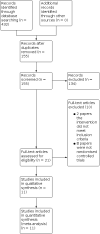
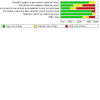
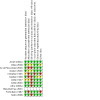
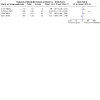
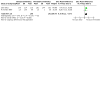

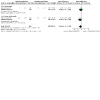
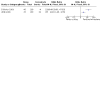
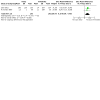
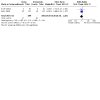
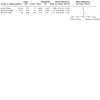
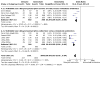
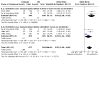
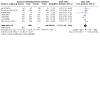
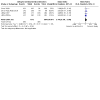
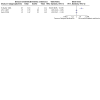
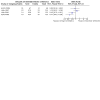
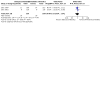
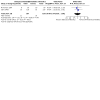
Update of
-
Delayed antibiotics for respiratory infections.Cochrane Database Syst Rev. 2013 Apr 30;(4):CD004417. doi: 10.1002/14651858.CD004417.pub4. Cochrane Database Syst Rev. 2013. Update in: Cochrane Database Syst Rev. 2017 Sep 07;9:CD004417. doi: 10.1002/14651858.CD004417.pub5. PMID: 23633320 Updated.
References
References to studies included in this review
Arroll 2002a {published and unpublished data}
-
- Arroll B, Kenealy T, Kerse N. Do delayed prescriptions reduce the use of antibiotics for the common cold? A single-blind controlled trial. Journal of Family Practice 2002;51(4):324-8. - PubMed
Chao 2008 {published data only (unpublished sought but not used)}
-
- Chao J, Kunkov S, Reyes L, Lichten S, Crain E. Comparison of two approaches to observation therapy for acute otitis media in the emergency department. Pediatrics 2008;121(5):1352-6. - PubMed
De la Poza Abad 2016 {published data only}
-
- De La Poza Abad M, Dalmau GM, Bakedano MM, Gonzalez AIG, Criado YC, Anadon SH, et al. Rationale, design and organization of the delayed antibiotic prescription (DAP) trial: a randomized controlled trial of the efficacy and safety of delayed antibiotic prescribing strategies in the non-complicated acute respiratory tract infections in general practice. BMC Family Practice 2013;14:Article No.63. [DOI: 10.1186/1471-2296-14-63] - DOI - PMC - PubMed
-
- EUCTR2011-005741-13-ES. Delayed antibiotic prescription for respiratory infections in children. www.clinicaltrialsregister.eu/ctr-search/search?query=eudract_number:201... 12 December 2011.
-
- NCT01363531. Clinical trial for the assessment of delayed antibiotic treatment strategies in the non-complicated acute respiratory tract infections in General Practice. clinicaltrials.gov/show/NCT01363531 18 May 2011.
Dowell 2001 {published data only}
El‐Daher 1991 {published data only}
-
- El-Daher N, Rawashedeh N, Al-Khalil I, Abu-ektaish F. Immediate versus delayed treatment of group A beta-haemolytic streptococcal pharyngitis with penicillin V. Pediatric Infectious Disease Journal 1991;10(2):126-30. - PubMed
Gerber 1990 {published data only}
-
- Gerber M, Randolph M, DeMeo K, Kaplan E. Lack of impact of early antibiotic therapy for streptococcal pharyngitis on recurrence rates. Journal of Pediatrics 1990;117(6):853-8. - PubMed
Little 1997 {published data only}
Little 2001 {published and unpublished data}
Little 2005a {published data only}
-
- ISRCTN92319172. Randomised controlled trial of a leaflet and three prescribing strategies for the management of acute lower respiratory tract illness. Acute Cough Trial. isrctn.com/ISRCTN92319172 23 October 2000.
-
- Little P, Rumsby K, Kelly J, Watson L, Moore M, Warner G, et al. Information leaflet and antibiotic prescribing strategies for acute lower respiratory infection. JAMA 2005;293(24):3029-35. - PubMed
Mas‐Dalmau 2021 {published data only (unpublished sought but not used)}
-
- Mas-Dalmau G, Villanueva López C, Gorrotxategi Gorrotxategi P, Argüelles Prendes E, Espinazo Ramos O, et al . Delayed antibiotic prescription for children with respiratory infections: a randomized trial. Pediatrics 2021;147(3):e20201323. - PubMed
Pichichero 1987 {published data only}
-
- Pichichero M, Disney F, Talpey W, Green J, Francis A, Roghmann K, et al. Adverse and beneficial effects of immediate treatment of group A beta-haemolytic streptococcal pharyngitis with penicillin. Pediatric Infectious Disease Journal 1987;6(7):635-43. - PubMed
Spiro 2006 {published data only}
-
- Spiro DM, Tay KY, Arnold DH, Dziura JD, Baker MD, Shapiro ED. Wait-and-see prescription for the treatment of acute otitis media: a randomized controlled trial. JAMA 2006;296(10):1235-41. - PubMed
References to studies excluded from this review
Agnew 2013 {published data only}
-
- Agnew J, Taaffe M, Darker C, O'Shea B, Clarke J. Delayed prescribing of antibiotics for respiratory tract infections: use of information leaflets. Irish Medical Journal 2013;106(8):243-4. - PubMed
Cates 1999 {published data only}
De la Poza Abad 2013 {published data only}
-
- De la Poza Abad M, Mas Dalmau G, Moreno Bakedano M, González González AI, Canellas Criado Y, Hernández Anadón S, et al. Rationale, design and organization of the delayed antibiotic prescription (DAP) trial: a randomized controlled trial of the efficacy and safety of delayed antibiotic prescribing strategies in the non-complicated acute respiratory tract infections in general practice. BMC Family Practice 2013;14(63):1-7. [DOI: 10.1186/1471-2296-14-63] - DOI - PMC - PubMed
Fischer 2009 {published data only}
-
- Fischer T, Singer A, Chale S. Observation option for acute otitis media in the emergency department. Paediatric Emergency Care 2009;25(9):575-8. - PubMed
Ghebrehewet 2020 {published data only}
-
- Ghebrehewet S, Shepherd W, Panford-Quainoo E, Shantikumar S, Decraene V, Rajendran R, et al. Implementation of a delayed prescribing model to reduce antibiotic prescribing for suspected upper respiratory tract infections in a hospital outpatient department, Ghana. Antibiotics (Basel) 2020;9(773):1-11. - PMC - PubMed
Little 2014 {published data only}
Newson 2009 {published data only}
-
- Newson L. Delayed prescribing. Practice Nurse 2009;37(2):21.
Siegel 2003 {published data only}
-
- Siegel R, Kiely M, Bien JP, Joseph EC, Davis JB, Mendel SG, et al. Treatment of otitis media with observation and a safety-net antibiotic prescription. Pediatrics 2003;112(3):527-31. - PubMed
Vouloumanou 2009 {published data only}
-
- Vouloumanou E, Karageorgopoulos D, Kazanti M, Kapaskelis A, Falagas M. Antibiotics versus placebo or watchful waiting for acute otitis media: a meta-analysis of randomized controlled trials. Journal of Antimicrobial Chemotherapy 2009;64(1):16-24. - PubMed
Worrall 2010 {published data only}
-
- NCT02732847. Trial of Post-Dated Delayed Antibiotic Prescriptions [Post-Dated Versus Voluntary Delayed Antibiotic Prescriptions for Acute Respiratory Infections in Primary Care: A Randomized Trial]. clinicaltrials.gov/show/NCT02732847 27 May 2010.
References to ongoing studies
NCT01800747 {published data only}
-
- NCT01800747. Clinical trial for the assessment of delayed antibiotic treatment in pediatric (DAP-Pediatrics) [Clinical Trial for the Assessment of Delayed Antibiotic Treatment in the Non-complicated Acute Respiratory Tract Infections in Pediatric (Study DAP-Pediatrics)]. clinicaltrials.gov/ct2/show/record/NCT01800747 26 February 2013.
Additional references
AHRQ 2016
-
- Agency for Healthcare Research and Quality. Improving antibiotic prescribing for uncomplicated acute respiratory tract infections. Rockville (MD): AHRQ; 2016. Comparative Effectiveness Review No. 163. - PubMed
Arroll 2002b
-
- Arroll B, Goodyear-Smith F, Thomas D, Kerse N. Delayed antibiotic prescriptions: what are the experiences and attitudes of physicians and patients? Journal of Family Practice 2002;51(11):954-9. - PubMed
Arroll 2003a
Arroll 2003b
Arroll 2013
Atkins 2004
Butler 2001
-
- Butler CC, Kinnersley P, Prout H, Rollnick S, Edwards A, Elwyn G. Antibiotics and shared decision-making in primary care. Journal of Antimicrobial Chemotherapy 2001;48(3):435-40. - PubMed
CDC 2017
-
- Centers for Disease Control and Prevention. Antibiotic/antimicrobial resistance. www.cdc.gov/drugresistance/ (accessed prior to 29 August 2017).
Datta 2008
-
- Datta M. Review: delayed or immediate prescriptions of antibiotics have similar clinical outcomes in respiratory infections. Evidence-Based Medicine 2008;13(2):42. - PubMed
Dickersin 1994
Everitt 2006
French 1950
-
- French JRP. Field experiments: changing group productivity. In: Miller JG, editors(s). Experiments in Social Process: a Symposium on Social Psychology. McGraw-Hill, 1950:82.
Goossens 2005
-
- Goossens H, Ferech M, Vander Stichele R, Elseviers M. Outpatient antibiotic use in Europe and association with resistance: a cross-national database study. Lancet 2005;365(9459):579-87. - PubMed
GRADEpro GDT [Computer program]
-
- GRADE Working Group, McMaster University GRADEpro GDT. Version (accessed 15 April 2017). Hamilton (ON): GRADE Working Group, McMaster University.
Higgins 2011
-
- Chapter 8: Assessing risk of bias in included studies. In: Higgins JP, Green S, editor(s). Cochrane Handbook for Systematic Reviews of Interventions Version 5.1.0 (updated March 2011). The Cochrane Collaboration, 2011. Available at handbook.cochrane.org.
Hoffmann 2017
-
- Hoffmann T, Oxman A, Ioannidis J, Moher D, Lasserson T, Tovey D, et al. Enhancing the usability of systematic reviews by improving the consideration and description of interventions. BMJ 2017;358:j2998. - PubMed
Johnson 2007
-
- Johnson NC, Holger JS. Pediatric acute otitis media: the case for delayed antibiotic treatment. Journal of Emergency Medicine 2007;32(3):279-84. - PubMed
Kempf 2016
-
- Kempf I, Jouy E, Chauvin C. Colistin use and colistin resistance in bacteria from animals. International Journal of Antimicrobial Agents 2016;48:598-606. - PubMed
Kenealy 2013
Kumar 2003
Legare 2007
-
- Legare F, Labrecque M, Leblanc A, Thivierge R, Godin G, Laurier C, et al. Does training family physicians in shared decision making promote optimal use of antibiotics for acute respiratory infections? Study protocol of a pilot clustered randomised controlled trial. BMC Family Practice 2007;8:65. - PMC - PubMed
Levitt 2011
-
- Levitt SD, List JA. Was there really a Hawthorne effect at the Hawthorne plant? An analysis of the original illumination experiments. American Economic Journal: Applied Economics 2011;3(1):224-38.
Little 2005b
Little 2006
Little 2017
Macfarlane 1997
Moher 2009
Moore 2009
NICE 2016
-
- National Institute for Health and Care Excellence. Self-limiting respiratory tract infections – antibiotic prescribing overview. London: NICE; 2016. - PubMed
OMTG 2004
-
- Otitis Media Treatment Guidelines. Diagnosis and management of acute otitis media. Pediatrics 2004;113(5):1451-65. - PubMed
RevMan 2014 [Computer program]
-
- Nordic Cochrane Centre, The Cochrane Collaboration Review Manager 5. Version 5.3. Copenhagen: Nordic Cochrane Centre, The Cochrane Collaboration, 2014.
Sharland 2005
Simmonds in press
-
- Simmonds ME, Salanti G, McKenzie J, Elliott JE, on behalf of the Living Systematic Review Network. Living Systematic Reviews: 3. Statistical methods for updating meta-analyses. Journal of Clinical Epidemiology (in press). - PubMed
Smith 2014
Spinks 2013
Sun 2012
-
- Sun L, Klein E, Laxminarayan R. Seasonality and temporal correlation between community antibiotic use and resistance in the United States. Clinical Infectious Diseases 2012;55:687-94. - PubMed
Sung 2006
-
- Sung L, Arroll J, Arroll B, Goodyear-Smith F, Kerse N, Norris P. Antibiotic use for upper respiratory tract infections before and after an education campaign as reported by general practitioners in New Zealand. New Zealand Medical Journal 2006;119(1233):U1956. - PubMed
Tan 2008
-
- Tan T, Little P, Stokes T. Antibiotic prescribing for self limiting respiratory tract infections in primary care: summary of NICE guidance. BMJ 2008;337:a437. - PubMed
van Staa 2020
Van Zuijlen 2001
-
- Van Zuijlen DA, Schilder AG, Van Balen FA, Hoes AQ. National differences in incidences of acute mastoiditis: relationship to prescribing patterns for acute otitis media. Pediatric Infectious Disease 2001;20:140-4. - PubMed
Venekamp 2015
WHO 2014
-
- World Health Organization. Antimicrobial resistance: Global report on surveillance 2014. Geneva: WHO; 2014.
World Bank 2017
-
- World Bank. World Bank country and lending groups. World Bank (avialble at https://datahelpdesk.worldbank.org/knowledgebase/articles/906519-world-b...) 2017.
References to other published versions of this review
Spurling 2007
Spurling 2010
Publication types
MeSH terms
Substances
LinkOut - more resources
Full Text Sources
Other Literature Sources
Medical
Research Materials

